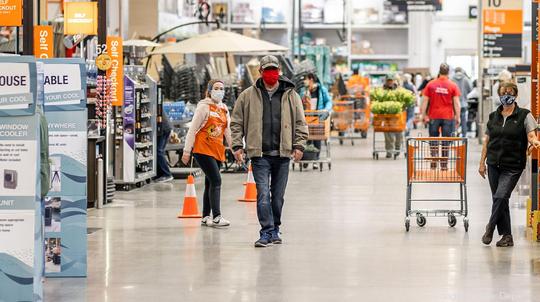
After more than a year of online shopping and curbside pickups, those adaptations and many others that Atlanta retailers made to survive the pandemic are likely permanent, experts say.
Retailers that didn’t have a strong online presence had to adapt, unable to rely on typical foot traffic, Accenture Innovation Hub Director Tiffany Gilbert said. Now, the first impression people have of a retailer is on an app or website, The Home Depot Senior Vice President of Information Technology Fahim Siddiqui said.
Gilbert and Siddiqui discussed the future of retail in Atlanta Inno’s State of Innovation virtual event with Voxie CEO Bogdan Constantin and Lillii RNB Inc. CEO Barbara Jones-Brown. The event focused on how the pandemic changed consumer behavior and how businesses are adapting to fast-changing trends. Sid Mookerji, managing partner at retail tech investment firm Silicon Road Ventures, moderated the panel. (Scroll to the bottom of the article to watch the panel.)
Technology is accelerating changes in retail, panelists said. Shopper personalization, increased automation, analytical data and immersive shopping experiences will become industry staples.

Personalization
Personalized shopping based on customer data is key for retailers, Constantin said.
Text messages are usually reserved for friends and family, but marketing startup Voxie lets retailers use the platform for conversations with customers. The conversations generate behavioral data that Voxie uses to help retailers connect with customers.
“Often brands want to go straight to ‘buy, buy, buy,’” Constantin said. “But first it needs to be, ‘Let me learn a little bit more about you.’”
At The Home Depot, if a store knows a customer is a plumber based on their customer profile, it can give precise recommendations when they search the online site.
“We are offering you value-add,” Siddiqui said. “We find you the appropriate product for the appropriate project with the appropriate information.”
Personalization also helps people find where they want to shop, like customers who want to patronize local businesses or support businesses from women and people of color, Constantin and Jones-Brown said.
Customer data is just as important in the logistics portion of e-commerce, Jones-Brown said. Her IT consulting firm launched the Freeing Returns management software to help businesses analyze return data and detect fraud.
"Is it one of your loyal customers making a return or a bad actor?” Jones-Brown said. “We have this personalized return policy based on knowing who that customer is."

Experiential shopping
Holiday sales are expected to increase 8.5% to 10.5% from last year, totaling from $843 billion to $859 billion, the National Retail Federation said this week. Online and other non-store sales are forecast to jump 11% to 15% to land somewhere between $218 billion and $226 billion.
The “Baby Boomer” generation will be swayed more toward buying online, according to an Accenture survey. But, 70% of “Gen Z” still plan to do holiday shopping in stores.
"There is actually still an interest in shopping in a store, and that interest is coming back,” Gilbert said.
Overall, 25% of consumers say they would like experiences, such as cooking class or children play areas, to entice them to shop in stores. Because of online browsing, products alone may not get people into a store.
The Home Depot has already offered free workshops to learn how to use tools and do home improvement projects. Those do-it-yourself projects have become even more popular during the pandemic, as homes have also transformed into offices, Siddiqui said.
Automation could help with the shopping experience, Constantin said. For example, a restaurant could create a more seamless process with separate lines for people ordering in-person and those picking up online orders.
Creating a pleasant shopping experience extends to workers. At The Home Depot, Siddiqui says taking care of company workers was the key to its revenue growth in the past year. Its second-quarter revenue climbed 8.1% to about $41.1 billion, up from about $38 billion a year earlier.
“That has been the secret sauce to delivering on the promise to our customers and communities,” Siddiqui said.
The focus on employees is especially important during nationwide labor shortages and record amounts of people quitting their jobs. Technology and innovation could help those employee experiences, Gilbert said.
Gilbert gave the example of a restaurant improving their back operations, including how the food was prepared. Those changes also improved worker retention and recruitment.
Watch the event to listen to panelists talk about robots, business growth and more:







